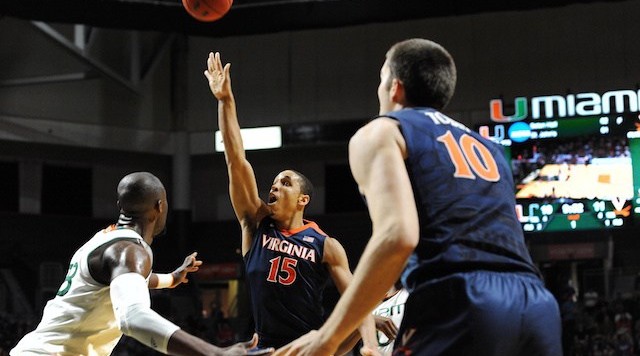March being what it is — namely, the most wildly unpredictable month in American sports — we could soon see a postseason which undoes the themes created by the college basketbal regular season.
Don’t count on it.
The Miami Hurricanes’ 64-61 win over the Virginia Cavaliers on Monday night in South Florida was a portrait of college basketball played well. No, the game was not a masterpiece — not with the many bricks and missed bunnies — but the Canes and Cavs showed Americans what it’s like when two well-coached college teams hit the floor.
Defensive rotations were sound. Stupid passes and other weirdly premature decisions were kept to a minimum. Effort was both sustained and considerable. Battles for 50-50 balls were savage and prolonged. Both teams knew what they were doing. This pivotal ACC contest — very likely for a top-two seed at the upcoming ACC Tournament, with an outside shot at the top seed in a race with North Carolina — deserved to be a generally good showcase for what is possibly the best conference in the country.
By and large, it was.
The aftermath matters for Miami, now within striking distance of North Carolina following this survival act against the school which has been the top seed in each of the past two ACC Tournaments. However, the bigger storyline from Canes-Cavs is how its ending neatly fits an anything-but-tidy college basketball season.
*
The outcome of this game wasn’t sealed, but it was certainly tilted in one direction, after Virginia’s Mike Tobey missed a two-footer in the final minute with the Cavs trailing, 60-59. That miss was Virginia’s last really good chance to win the game, a truly close encounter with a victory that never arrived.
As important as that miss was, it’s hardly the most memorable or significant close miss in the city of Miami’s basketball history.
This is the one:
Anyone who witnessed Game 7 of the 2013 NBA Finals (and Game 6, two nights earlier) will never forget not only Tim Duncan’s miss over Shane Battier, but the immediate reaction from one of the most noticeable stoics in sports. So expressionless so much of the time — so rarely moved to feel great emotion for reasons other than a (perceived) bad call against him — Duncan opened up his soul to the world after that miss. Who could forget Duncan’s awareness that a championship had almost certainly been decided as soon as the Miami Heat corralled the rebound with under 50 seconds to go in the San Antonio Spurs’ season?
That 2013 Finals series wasn’t always great, but it certainly stands as one of the better NBA playoff series of all time. Game 6 rates as a classic. Game 1 is an underrated and understated basketball laboratory, an aesthetically perfect form of the sport. The Spurs and Heat didn’t always play well at the same time, but they both showed the full measure of their skills. Game 7 wasn’t so much about the Xs or Os or the individual performances; it was about a man, a moment, and the experience of failure on a shot he’s made thousands upon thousands of times.
Thud. Off the rim. No good.
A short shot, simply not able to roll off the fingertips into its intended target, decided a game and enabled Miami residents to celebrate.
An opponent’s failure to hit a shot decided a sporting event, as opposed to a made basket. Sometimes, that’s how sports works. You can win a game because you soar above your foe, or you can win because your foe — given the final say in the matter — can’t finish his sentence.
Miami didn’t win because of its final defining act. It won because Virginia — on a night when both teams repeatedly struggle to finish near the tin — produced the final failure, an inverse of the “last shot wins” principle.
That’s the season in a nutshell, is it not?
Plenty of very good teams exist, but greatness is elusive. College basketball — now and in March — is waiting to be seized by one team which will rise above the chaos. Kansas might be the closest thing, as the Jayhawks storm to the Big 12 title (watch KU lose to Baylor Tuesday night; we’ll see), but no one would anoint Kansas as a dominant force.
In the ACC and elsewhere, most of the winning this season has been the result of others’ deficiencies, and most of the losing this season has been marked by the failure to reach a relatively high standard. Supremacy, authoritative excellence, swagger — these qualities sit on a mantelpiece in 2016, untouched and pristine. So far, the path to victory for most clubs has been defined more by survival than by imposing one’s will on everyone else.
Miami 64, Virginia 61, thanks to a missed bunny from a big man.
It wasn’t Duncan versus Battier in Game 7 three years ago, but it has made the people of Miami glad… and it’s exactly the way this college basketball season has proceeded to this point in time.

